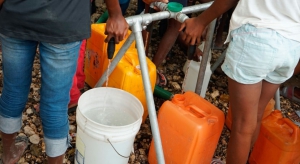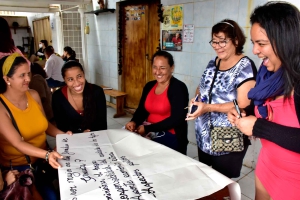In Haiti, as in other countries where the Fund works, the link between women and water is indisputable and dominant, as they provide practically all the water used in households. They know where the water sources are and the service hours of the public kiosks, and they are in charge of collecting, storing, and managing the water. In addition, they recycle it in order to use it efficiently and know its quality: they use less clean water for washing and irrigation and try to preserve it from contamination. They also impact its conservation and are almost entirely responsible for agricultural production for self-consumption, which is fundamental for the country’s food sovereignty.
So far, thanks to the program implemented in Haiti, the water distribution networks of 12 cities with more than 10,000 inhabitants will be rehabilitated and extended, as well as a large number of systems in rural areas, and access to water has so far been improved for nearly half a million people throughout the country.
Related News:
 FCAS interventions contribute to achieving equal gender opportunities
FCAS interventions contribute to achieving equal gender opportunities
El Fondo de Cooperación para Agua y Saneamiento (FCAS) es un instrumento de la Cooperación Española que tiene como principal objetivo asegurar el acceso a agua potable y saneamiento a las poblaciones más necesitadas de América Latina y el Caribe. Desde el Gobierno de España se han desembolsado 791 millones de euros en donaciones que han conformado, junto con las aportaciones de las contrapartes locales, una cartera de 1.276 millones de euros. En Haití, concretamente el programa del FCAS comenzó en el año 2012 y sigue ejecutándose. Al final de este, se habrán invertido cerca de 100 millones de dólares en la mejora de las infraestructuras de agua y saneamiento del país, así como en el refuerzo de capacidades técnicas.
Read article (Spanish) >>
